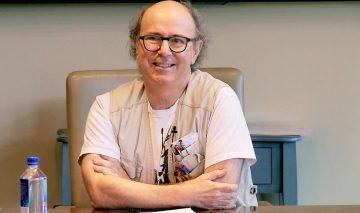Frank Wilczek in Edge:
 I’m a theoretical physicist, but I’m going to be talking about the future of mind and intelligence. It’s not entirely inappropriate to do that because physical platforms are absolutely a fundamental consideration in the future of mind and intelligence. I would think it’s fair to say that the continued success of Moore’s law has been absolutely central to all of the developments in artificial intelligence and the evolution of machines and machine learning, at least as much as any cleverness in algorithms.
I’m a theoretical physicist, but I’m going to be talking about the future of mind and intelligence. It’s not entirely inappropriate to do that because physical platforms are absolutely a fundamental consideration in the future of mind and intelligence. I would think it’s fair to say that the continued success of Moore’s law has been absolutely central to all of the developments in artificial intelligence and the evolution of machines and machine learning, at least as much as any cleverness in algorithms.
First I’ll talk about the in-principle advantages of artificial intelligence with existing engineering principles. Then I will talk about the enormous lead that natural intelligence in the world has, although there are obviously great motivations for having general-purpose artificial intelligence—servants, or soldiers, or other useful kinds of objects that are not out there. Then I’ll talk a little bit about the forces that will drive towards intelligence. Perhaps that’s superfluous here, but we’ve been talking about how improvements in intelligence are an end in themselves, but it’s worth at least saying why that’s going to happen. Finally, I’ll argue for an emphasis on a new form of engineering that is not being vigorously cultivated, and I’ll draw some consequences for what the future of intelligence will be.
More here.
